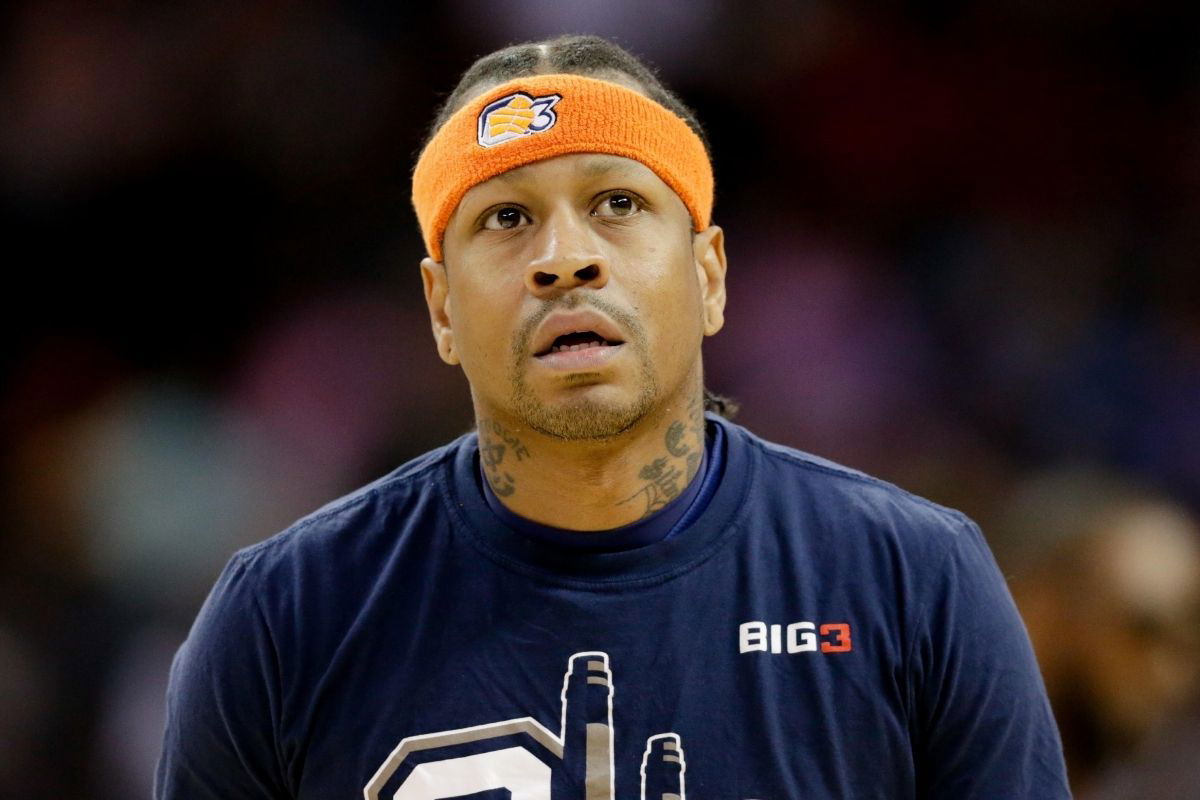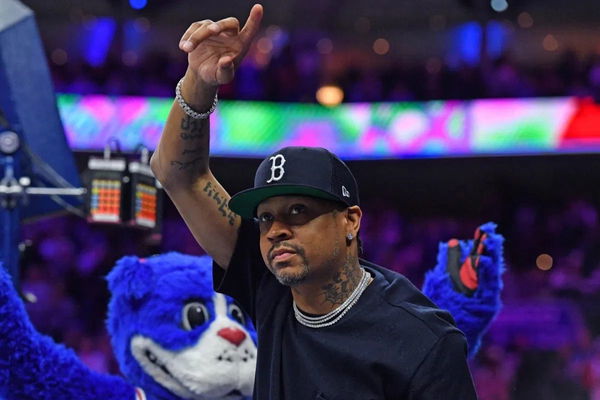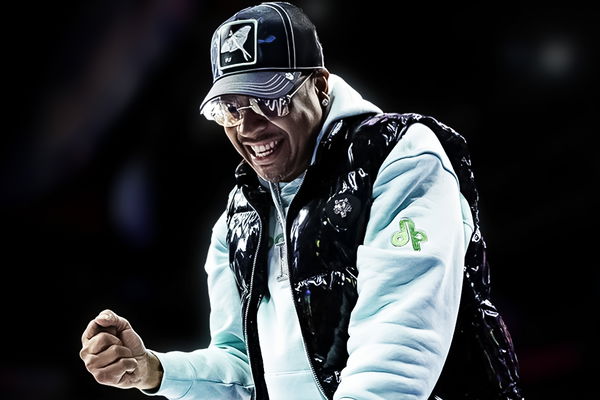
USA Today via Reuters
Jul 2, 2017; Charlotte, NC, USA; 3’s Company player Allen Iverson (3) stands on the court prior to the game against the Ghost Ballers at Spectrum Center. Mandatory Credit: Jeremy Brevard-USA TODAY Sports

USA Today via Reuters
Jul 2, 2017; Charlotte, NC, USA; 3’s Company player Allen Iverson (3) stands on the court prior to the game against the Ghost Ballers at Spectrum Center. Mandatory Credit: Jeremy Brevard-USA TODAY Sports
Ever wondered what makes players who not just impact the game but also bring a cultural impact too? Well, there is no doubt that it’s the early life and background of these players that end up shaping them. Given the fact that Allen Iverson was a cultural phenomenon in the league, it becomes quite interesting to know what made him into who he was.
Watch What’s Trending Now!
Surprisingly, though, despite his superstar status and long list of accolades, it’s usually his past financial woes that you hear of. But not so much on as to what shaped the former Philadelphia 76ers star. So let’s have a closer look at where he comes from.
ADVERTISEMENT
A closer look at Allen Iverson’s ethnic heritage and family background
When you think of Allen Iverson, you probably picture the fearless NBA star who changed the game with his swagger and skill. But to truly understand who he is, you have to go back to where it all began—his roots in Hampton, Virginia. Born in 1975, Iverson grew up as an African-American in a close-knit, working-class neighborhood, shaped by the struggles and strength that surrounded him.
His story starts with his mother, Ann Iverson, who gave birth to him at just 15 years old. His father, Allen Broughton, was absent from the very beginning and never played a role in Iverson’s life. Clearly, Ann had her own share of hardships—raised by her grandmother and meeting Broughton as a child in Hartford, Connecticut. By the time Allen was born, she had moved to Hampton’s Aberdeen area, setting the stage for the rest of their lives.
As for Allen Iverson, he earned the nickname “Bubba Chuck,” thanks to two of his uncles. He wasn’t alone—extended family was all around—but poverty was a constant presence. As per the reports, Ann juggled multiple jobs: from assembling Avon products to working as a secretary at Langley Air Force Base, and even welding at the shipyard. She did whatever it took to support her kids.

USA Today via Reuters
Mar 10, 2022; Philadelphia, Pennsylvania, USA; Former Philadelphia 76ers player Allen Iverson acknowledges the crowd during the game against the Brooklyn Nets during the second quarter at Wells Fargo Center. Mandatory Credit: Eric Hartline-USA TODAY Sports
No wonder the bond between mother and son was unshakable. If you’ve seen the iconic photo of her kissing Allen Iverson after a big game, you know what we mean—it speaks louder than words, capturing the love and loyalty that defined their relationship.
As for Al’s childhood, it unfolded in the Aberdeen-Newport News section of Hampton, a historically Black neighborhood created during the 1930s as part of the New Deal “resettlement” plan for African-American families. That environment, full of both adversity and resilience, helped shape the legend he would one day become.
Allen Iverson’s athletic rise and cultural identity
Before AI ever stepped onto an NBA court, his life was already marked by challenges. But talent has a way of opening doors, and for Iverson, it led to a scholarship at Georgetown University, where legendary coach John Thompson took him under his wing. If you’ve ever watched early clips of Iverson at Georgetown, you’ll understand why the basketball world started paying close attention—his quickness and determination were impossible to ignore.
His college brilliance paved the way for the next big step. Iverson became the first overall pick in the 1996 NBA Draft. And once he landed in Philadelphia, he didn’t just join the league—he lit it up. With four scoring titles to his name and an MVP crown in 2001, he cemented himself as one of the era’s elite players. But Iverson’s influence didn’t end with stats and accolades. He brought something raw and real to the game—a bold reflection of Black urban culture.
Cornrows, tattoos, chains, and oversized clothes weren’t just fashion statements; they were part of his identity. As one fashion profile memorably put it, Iverson was “the NBA’s unapologetic streetwear hero”: his “blunt, unapologetic”: persona with “tats, cornrows and diamonds” “scared white America,” by putting hip-hop front-and-center on the court.

Imago
Imagn
However, this cultural impact wasn’t without friction. While Iverson helped make hip-hop style more visible and celebrated in basketball, it didn’t sit well with everyone. In 2005, the NBA introduced a dress code banning do-rags and baggy clothing—something many viewed as a direct response to Iverson and those following in his footsteps. Iverson didn’t just redefine how a point guard could play. He reshaped what it meant to look like a basketball star—and challenged the league to face a culture it couldn’t ignore. However, it’s not as if the Sixers legend’s attachment to his culture and community only brought conflicts.
Allen Iverson’s community contributions and legacy
Iverson’s journey didn’t end with basketball glory—it evolved into something even more meaningful. In recent years, he has made it clear that giving back, especially to young people in communities like the one he came from, is close to his heart. Just take January 2024, for instance, when he took center stage at a Philadelphia 76ers charity gala. The event supported the team’s Youth Foundation, which funds after-school activities and basketball clinics. Thanks to the turnout, over $1.9 million was raised. And Iverson’s words that night struck a chord: “It’s important to me because I matter…if me being who I am can help in any way, then why not?…especially when it has a lot to do with kids.”
No wonder that back in Hampton, Virginia—where his story began—the community hasn’t forgotten what Iverson stands for. Bethel High School, his alma mater, now proudly calls its basketball gym and court the “Allen Iverson Gymnasium.” Every spring, the Iverson Classic All-American basketball showcase draws top-tier high school talent to the same city that once nurtured his dreams.
Through both his actions and heartfelt words, Iverson remains a powerful symbol for countless African-American youths—a living reminder that rising from humble beginnings can lead not just to success, but to meaningful impact.
ADVERTISEMENT
ADVERTISEMENT
ADVERTISEMENT
ADVERTISEMENT